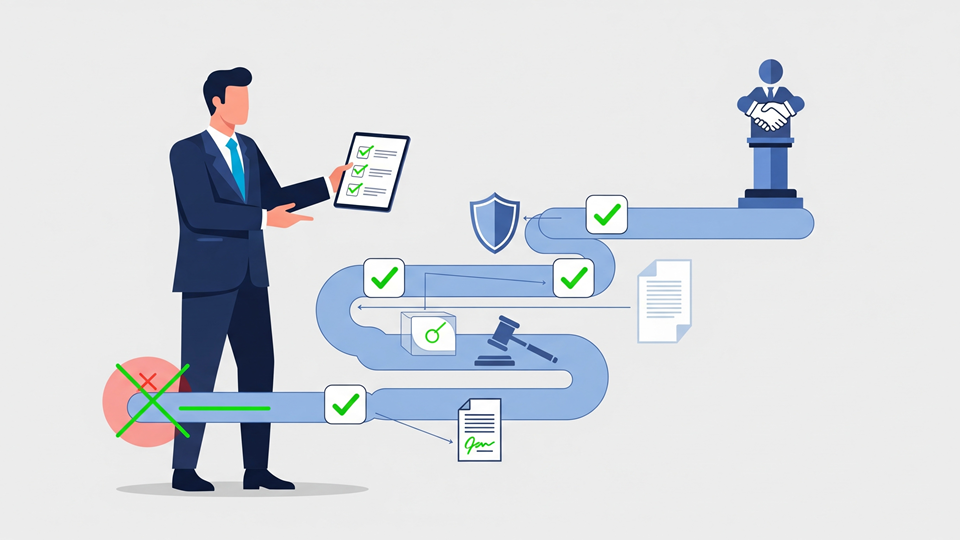
Avoiding Legal Pitfalls in Hiring: A Practical Guide
Learn how to avoid legal issues in hiring with practical steps. Understand anti-discrimination, employee classification, background checks, and documentation best practices for startups.
Read More

Hiring talent across borders is a growing trend for companies seeking diverse skill sets and global perspectives. However, international recruitment involves navigating complex legal and regulatory frameworks that differ by country. Compliance is essential to avoid fines, legal disputes, and reputational damage. Companies that prioritize international hiring compliance report higher employee satisfaction and lower turnover rates in global teams.
Each country has unique labor laws, covering employment contracts, termination policies, work hours, benefits, and more. For example, European countries often have stricter employee protections than the United States. Employers must research local labor regulations to ensure contracts meet legal requirements.
Hiring internationally requires understanding tax obligations and social security contributions. In some countries, employers must withhold income tax and contribute to social security, while in others, independent contractor arrangements may apply. Mismanagement can result in penalties and back payments.
Hiring employees who are not citizens of the country where the company operates often requires visas or work permits. Some countries allow remote work without a visa if the employee works abroad, but others require specific authorization. Employers must verify eligibility before formal offers.
Engage local legal counsel or global employment organizations to navigate complex regulations. For instance, an employer hiring in Brazil may work with a local HR firm to ensure contracts comply with labor laws and employee rights.
Develop standardized recruitment workflows that include compliance checkpoints. This can involve verifying documentation, local employment rules, and benefits packages. A consistent approach reduces the risk of errors and ensures fairness.
Verify the identity, eligibility to work, and background of international candidates. Background checks and reference verification should adhere to local privacy and data protection laws, which can vary significantly. For example, GDPR in Europe imposes strict rules on handling personal data.
Draft contracts that clearly outline roles, responsibilities, compensation, benefits, termination clauses, and local legal requirements. Consider including arbitration clauses or conflict resolution procedures to manage disputes internationally.
In some countries, hiring contractors instead of full-time employees simplifies compliance. However, misclassification can lead to fines and legal disputes. Ensure agreements define scope of work, payment terms, and compliance with local laws.
Global payroll systems help manage multi-country taxation, deductions, and currency conversion. Choosing a payroll provider with expertise in international compliance reduces errors and ensures timely payments.
Some countries mandate specific benefits, such as health insurance, pension contributions, or paid leave. Employers must integrate these into payroll and contracts to remain compliant. For instance, in Germany, employees receive statutory health coverage and vacation leave that must be reflected in agreements.
International recruitment involves collecting sensitive personal data. GDPR, CCPA, and other regulations impose strict rules on storage, transfer, and processing of personal information. Implement secure systems and obtain explicit consent from candidates.
When sharing candidate information across countries, ensure compliance with local regulations. Standard contractual clauses or approved data transfer mechanisms can facilitate legal international data flow.
Remote employees working from other countries may create legal obligations in their jurisdiction. Employers must understand local labor laws, taxation, and employment rights even if the employee never physically enters the company’s country.
While not strictly legal, managing remote teams across multiple time zones affects compliance with work hours and overtime regulations. Scheduling flexibility and clear policies help avoid violations.
Ensure HR teams are trained in international employment compliance. Regular updates on changes in local labor laws, tax policies, and immigration regulations are crucial for avoiding mistakes.
Onboarding processes should educate international hires about local policies, benefits, and expectations. Clear communication fosters compliance awareness and reduces misunderstandings.
Leading tech firms hire talent worldwide using global employment platforms that manage compliance automatically. This reduces administrative burden and ensures adherence to local laws for contracts, payroll, and benefits.
Marketing and consulting agencies often employ contractors in multiple countries. By implementing clear agreements and using local payroll providers, they maintain legal compliance and protect the organization from penalties.
Hiring across borders requires careful attention to employment law, taxation, visas, data privacy, and remote work considerations. By standardizing processes, partnering with experts, and leveraging technology, companies can recruit global talent while staying compliant. Platforms like Zamdit can streamline candidate management and documentation, helping ensure that international recruitment aligns with legal and regulatory standards.

Learn how to avoid legal issues in hiring with practical steps. Understand anti-discrimination, employee classification, background checks, and documentation best practices for startups.
Read More
Recruitment compliance is essential for startups to avoid legal risks. Learn practical tips to implement anti-discrimination, data privacy, and eligibility verification best practices.
Read More
Understand global hiring compliance, including GDPR and EEOC. Learn practical strategies to manage candidate data, prevent discrimination, and ensure legally compliant recruitment worldwide.
Read MoreZamdit brings together every tool you need to find, assess, and hire top talent faster, smarter, and with complete clarity.
No credit card required
